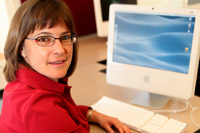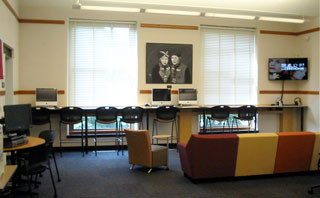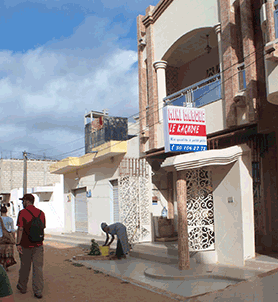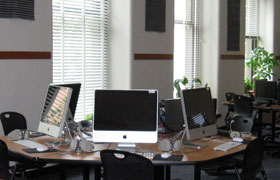In Spring 2012, Dr. Charlotte Melin will offer a new German-language course Contemporary Germany: Food, Energy, Politics, that students can use towards the completion of a Minor in Sustainability Studies as well as a Major or Minor in German.
 Beth Kautz, Director of Language Instruction in GSD and liaison to the CLA Language Center, piloted some of this course content at World Languages Day (WLD) on May 17, 2011, with a short Green Germany class for high school students. German students from Lincoln High, in Thief River Falls, Minnesota attended this course virtually through AdobeConnect. The class was offered three times, and for two of the class periods, only virtual students attended but one class was a mix of 50% virtual students, and 50% in-person students (not from Lincoln).
Beth Kautz, Director of Language Instruction in GSD and liaison to the CLA Language Center, piloted some of this course content at World Languages Day (WLD) on May 17, 2011, with a short Green Germany class for high school students. German students from Lincoln High, in Thief River Falls, Minnesota attended this course virtually through AdobeConnect. The class was offered three times, and for two of the class periods, only virtual students attended but one class was a mix of 50% virtual students, and 50% in-person students (not from Lincoln).By offering this course at WLD before the U of M credit-course is offered, Beth was able to acquire feedback from the students on their engagement with the material, as well as feedback on the effectiveness of the virtual course teaching methodology. The students' reactions to this course will be extremely beneficial for the continuing development of the Green German course curriculum.
I asked Beth to further explain the project, how planning and teaching a class virtually was different from teaching in a traditional classroom setting, and what she gained from this virtual teaching experience.
How did the idea for a class focused on the environment and sustainability develop?
There are three factors that came together. First of all, there was a personal interest on the part of Dr. Melin and myself in topics related to the environment and sustainability. Secondly, the topic is and has been very important culturally, politically and economically in Germany for decades. Finally, this type of course is a step toward offering more courses at the university that integrate foreign languages and cultures into various disciplines and content areas, a program known as FLAC (Foreign Languages Across the Curriculum).
How will a knowledge of the German language benefit those who wish to pursue a career in environmental science and sustainability studies
Germany is a world leader in research, development and use of renewable energies, including solar, wind and bio-mass power. There also are German architectural firms that consult all over the world on urban planning and design. Our students can help bring that knowledge to American companies and communities investing in green technologies and sustainability initiatives at the local, regional and national level.
How is the process of planning a virtual class different from planning a regular class?
By far the most difficult aspect is structuring opportunities to get feedback from the virtual participants. In a face-to-face classroom environment, I really heavily on visual cues and body language to gauge how well my students understand me or the task I have asked them to complete. When I see that students need help, I can walk over to them and address their concerns verbally with the support of gestures. In the virtual classroom, I made use of "polls," similar to a clicker-response system and group responses on the virtual whiteboard to get feedback from students.
How did you engage the virtual students, and insure that they didn't feel they were simply on the receiving end of a lecture?
In this virtual course, all the participants were together in one classroom in Thief River Falls along with their regular German teacher. I was the only one physically separated from the larger group. For several activities, I introduced a short video clip and discussion questions, which they then watched and discussed in small groups face-to-face in their classroom. After 10 minutes, we established contact again and they shared their insights with me and the whole group through a multiple-choice poll or written text on the group whiteboard.
What did you learn from this experience that will inform the development of the German credit course?
In the virtual class I taught, I used a variety of authentic German materials from the internet. These online materials are extremely helpful not only in explaining the basic concepts of sustainability, but also provide a very rich cultural context for exploring how concerns about food safety, the maintenance of nuclear power plants, the preservation of urban green-spaces, etc. play themselves out throughout society. As our project has progressed, we have continued to compile an extensive set of web links to videos, websites, images and interviews for 15 different learning modules. Through Title VI funding from CARLA, these materials also will be available to high school and university instructors throughout the country.
What piece of advice would you give an instructor interested in planning a virtual or hybrid class?
Keep your learning objectives at the forefront of your lesson planning. Ask yourself the same questions you would when planning any lesson: "What should students know or be able to do at the end of the lesson?" "How will I know that they learned it?" "What kind of support, information and instructions to students need before, during and after to successfully complete the task?" Then you need to think about which online tools best facilitate each of the those activities. In general, it requires more advance planning and preparation so that all the resources are available to students online and instructions are clearly understood without additional verbal explanation.
Thank you to Teran Pederson-Linn, recent CLA graduate and former Language Center staff member, for her work on this article.
For more information on World Languages Day, see this summary of the 2011 event.



 As before, the Lab offers high-quality, low-cost laser printing; computer use for 30 seconds or 3 hours; and of course, friendly and helpful assistance from Lab attendants.
As before, the Lab offers high-quality, low-cost laser printing; computer use for 30 seconds or 3 hours; and of course, friendly and helpful assistance from Lab attendants.